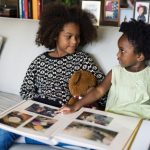Hosting a kids’ storytelling workshop is a wonderful opportunity to ignite the imagination of young minds while fostering a love for literature. By creating a space where children feel comfortable expressing themselves, you can nurture their storytelling skills and build their confidence. This article will provide tips to ensure your workshop is both engaging and enriching, setting the stage for a memorable experience for all participants.
Create a Welcoming Environment for Young Storytellers
To set the right tone for your workshop, it’s essential to create a welcoming environment where children feel safe and encouraged to share their ideas. Start by arranging the space in a way that promotes interaction, such as using seating in a circle. This layout fosters a sense of community and makes it easier for everyone to see and hear one another. Decorate the space with colorful visuals, puppets, or themed props that can inspire storytelling and catch the children’s attention.
Incorporating comfortable seating options—like cushions or bean bags—can also help make the environment more inviting. The goal is to create a cozy, relaxed atmosphere where children are free to express their thoughts without fear of judgment. As the host, your demeanor plays a significant role; greet the children warmly and show enthusiasm for storytelling to help them feel at ease.
Additionally, consider including icebreaker activities to help the kids get to know one another. Simple games or group discussions about their favorite stories can break down barriers and establish camaraderie among participants. When kids feel connected and comfortable, they’re more likely to engage actively in the workshop, leading to a more vibrant storytelling experience.
Choose Engaging Themes to Spark Imagination
Selecting themes that resonate with kids can significantly enhance their enthusiasm for storytelling. Consider topics that are age-appropriate and relevant to their interests, such as adventures in space, magical creatures, or everyday heroes. These themes not only pique curiosity but also provide a framework for children to build their narratives, allowing them to explore their creativity within a defined context.
In addition to the classic themes, you can introduce contemporary subjects that they may relate to or find intriguing. Discussing friendship, kindness, or environmental issues can inspire children to weave meaningful messages into their stories. By choosing themes with depth, you encourage them to think critically and express their thoughts and feelings through storytelling.
Don’t hesitate to incorporate elements of pop culture or current trends that kids are familiar with. For instance, themes related to popular movies, books, or games can excite their imaginations even further. Encouraging them to draw from their own experiences while connecting to these themes will make the storytelling process more enjoyable and personal.
Incorporate Fun Activities to Enhance Participation
Engagement is key in a storytelling workshop, and incorporating fun activities can significantly enhance participation. Use interactive games that promote storytelling skills, such as “Story Dice” or “Story Cubes,” where kids roll dice with different images and create a narrative based on the results. These playful elements can make storytelling feel less daunting and more like an exciting challenge.
Another excellent activity is a collaborative storytelling exercise. Start a story and pass it around the group, allowing each child to add a sentence or two. This activity not only encourages teamwork but also exposes kids to various styles and ideas, enriching their own storytelling techniques. The unpredictability of collaborative storytelling can lead to laughter and creativity, making the experience memorable.
You can also include arts and crafts related to storytelling, such as creating character masks or drawing illustrations for their stories. This allows children to visualize their narratives and express themselves creatively beyond just words. Combining storytelling with hands-on activities keeps the energy high and ensures that every child remains engaged throughout the workshop.
Encourage Creativity with Open-Ended Story Prompts
Open-ended story prompts can be a powerful tool in a kids’ storytelling workshop. These prompts provide a foundation while allowing room for creativity and individual expression. For example, you might start with a prompt like, “What if you found a hidden door in your school?” Questions like these encourage children to think outside the box and explore various possibilities in their narratives.
In addition to prompts, you can encourage kids to draw inspiration from their surroundings. Invite them to describe a favorite place, a memorable event, or an interesting object in the room. By connecting their storytelling to personal experiences, young storytellers can develop their unique voices and styles, leading to richer narratives.
Be sure to celebrate the diversity of ideas that emerge from these prompts. Each child’s interpretation will be different, and embracing this individuality is crucial for fostering a supportive environment. Encourage them to share their stories without fear of comparison; this empowers them to trust their instincts and explore their creativity fully.
Provide Guidance While Allowing Individual Expression
While it’s essential to guide children in their storytelling journey, it’s equally important to allow them space to express themselves freely. Start by providing a structured framework, like a story arc or key elements that should be included (setting, characters, conflict, resolution). This foundational guidance can help kids understand how to construct their narratives effectively.
However, be cautious not to impose your vision of a “good story” onto them. Encourage them to take risks and explore unconventional ideas. If a child wants to tell a story about a talking sandwich, embrace that creativity and provide supportive feedback. This approach nurtures their confidence and encourages them to develop their unique style rather than conform to predefined notions of storytelling.
As the workshop progresses, consider holding one-on-one sessions with quieter participants, providing them personalized attention and encouragement. This can help them feel more comfortable sharing their thoughts and stories. By striking a balance between guidance and freedom, you can create an environment where every child feels empowered to tell their stories in their own distinctive way.
Celebrate Every Story to Build Confidence in Kids
Celebrating each child’s story is crucial in building their confidence and fostering a love for storytelling. At the end of the workshop, dedicate time for each child to share their narrative with the group. This not only validates their efforts but also allows them to experience the joy of sharing their creativity with others.
Encourage positive feedback from peers, focusing on what they enjoyed about each story. This communal celebration can create a supportive atmosphere and remind children that storytelling is not just about the content, but also about connection and sharing experiences with others. Acknowledging their hard work reinforces their self-esteem and encourages them to continue developing their storytelling skills.
To further commemorate their achievements, consider providing small certificates or tokens of participation. These tangible reminders can serve as motivation for future storytelling endeavors. Ultimately, fostering an environment of celebration and support will instill a lifelong love for storytelling in children, helping them appreciate the beauty of sharing narratives with others.
Hosting a kids’ storytelling workshop can be a transformative experience for both the participants and the facilitator. By creating a welcoming environment, choosing engaging themes, incorporating fun activities, and celebrating every story, you can help nurture the storytelling talents of young children. These tips not only enhance their creativity but also build confidence, ensuring that each child leaves the workshop with a newfound appreciation for the power of stories. As you embark on this journey, remember that every story is unique, and every storyteller deserves to have their voice heard.










